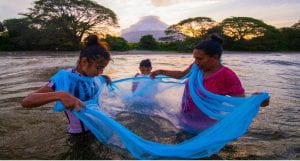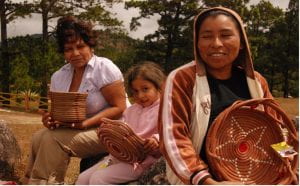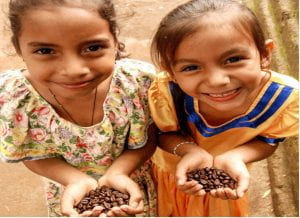by April Alvarez
The country of Nicaragua is rich in agriculture yet still suffers when it comes to the meeting the basic needs of the Nicaraguan people. However, women are the most severely affected by this as they are the primary bread winners of their homes, yet they do not have access to the same job opportunities that men do, and they are also fighting for their healthcare rights. The structure and dynamic of families vary from culture to culture–in Latin cultures, for instance, men have been taught to be the head of the household, provide, protect, and lay a solid foundation for the family, and the role of women usually consists of tending to the responsibilities of the home and caring for the children. Most of these roles are shaped by the behavior and values of the family as well as by society, which persuades or enforces the presence of certain behaviors and norms. Men are portrayed as dominate figures while the women are docile. Men take pride in their dominate role to an extent that may not be frequently seen in other cultures. This heavy presence of men dominating women is known as the machismo culture, and it has inevitably affected the way that women are portrayed in society and has negatively impacted their access to healthcare.

Machismo is learned through social interactions and is instilled in boys from the moment of birth through adulthood. “Boys quickly learn that they are not supposed to cry, that they have far greater freedom than their sisters and that adaptation, submissiveness and responsibility for children and domestic work are for girls” (Berglund, Liljestrand, Marín, Salgado, & Zelaya, 2000). Boys are taught that crying is a sign of weakness and that deprives them of the ability to express all their emotions and by developing a nature of pride and coldness, they are forced to swallow emotional burdens rather than voice them. Consequently, this process affects how they treat and view the women in their lives. Women, therefore, never escape the cycle of being viewed as docile creatures who’s only value comes from how well they can perform household chores and care for children.
Because the unemployment and poverty rate are so high in Nicaragua, women are often taught that they need to depend on a man for economic support. However, the high pregnancy rate is also a consequence from the lack of sexual education in schools and in homes by parents. The country is heavily influenced by Christianity, which emphasizes the importance of purity before marriage; however, many homes fail to educate or emphasize the role that men play in this as well. The nature of machismo emphasizes or rewards men who are womanizers, which inevitably leads to amounted responsibility if they get a woman pregnant. It is common for men to have a wife and children but also have a few girlfriends that they see from time to time to “destress” from their home or work life. While the man can go out and have fun with other women and have unlimited liberties, if a woman is even suspected as being unfaithful her husband may beat her. While an outsider may easily suggest that the women in the relationship should leave if they find themselves under these circumstances, it is not that easy, especially when the man is considered the family’s stability and support. However, other family members have a heavy influence on why a woman stays with her husband. Adriana, a young lady in her twenties who participated in a study about adolescent pregnancies in Nicaragua said that “they teach us that you have to endure, to suffer, because that is our obligation. Maybe it’s because their mothers treated them like that…. Consequently, they teach us to be only mothers and housewives” (Berglund, Liljestrand, Marín, Salgado, & Zelaya, 2000). This tradition is so deeply rooted in the culture that it has ingrained the idea that a women’s value is lost if they leave their husbands. Their first husband shall be their last and if they leave, no one else will love them. Women often question every decision they make for this same reason and if they are abused by their husbands then they have been psychologically conditioned to think they are the ones to blame.

One of the characteristics of machismo is respect and to challenge a decision made by one’s husband, who is seen as a superior, is like challenging their masculinity and it is a symbol of disrespect too. Men submerged in the machismo culture are also evaluated as a man based on their ability to have children therefore, more is better. Men have been able to justify this view is by finding ways to manipulate women so that they maintain their power. A study conducted in the cities of Managua and Leon evaluated how men viewed reproductive health and their responses to participating in gender training programs. One of the men stated that “He aims to help other young people avoid the negative consequences of unsafe sexual behavior, such as unintended pregnancies, sexually transmitted diseases, and HIV” (Torres, Goicolea, Edin & Öhman, 2012). This is an important finding as it successfully communicated how the behaviors of men were affecting not only the women but also their own health. The men take immense pride in having intercourse with women without using protection because it was another way of asserting their dominance. However, many were not aware of how those habits were exposing them to health dangers.
Despite the raise in awareness, men in Nicaragua still fail to break the cycle of violence and take any real initiative. In fact, in many areas the problem has worsened which affects women and children living in the home as they become exposed to situations that they begin to perceive as normal. “The fact that children are so often witnesses to violence against their mothers is of particular concern, not only because it exposes them to the risk of abuse themselves but also, in the case of boys, to the risk of becoming battering husbands as adults” (Ellsberg, Peña, Herrera, Liljestrand & Winkvist, 2000). The violence that women and even children are exposed to has more than physical consequences, it can also lead to a higher risk of illness further along in their lives. There is only so much stress that the body can take without releasing it, therefore, the body can become ill from all the intensity and constant fight for survival. The main reason men may have not been compelled to change their behavior is due to their social circles, especially other men. Most men have the “fear of rejection and discrimination” because of the “peer and family pressure to conform to traditional norms and values” (Torres, Goicolea, Edin & Öhman, 2012). Without the support of the people closest to them, they are less likely to step out of their comfort zone. They would also have to battle with being perceived as crazy because advocating for women’s rights is wrong or does not matter. No one likes to be rejected, especially if your masculinity is in question. A male who begins to speak out against domestic violence and the cultural norms would be deemed unworthy of respect because they have become soft and weak.
Women’s centers known as Casas de Mujer in Nicaragua have been successful in holding men to a high behavioral standard by equipping women with the knowledge of their rights by laws of the countries. Overall, the houses have provided a safe space for women where they can feel reassured, unashamed, or guilty, and be educated on their legal options, as well as on their value as a human being. The houses also help women unravel how machismo has affected their lives, make self-defense available, and teach women how they can play a role in breaking machismo norms with their sons. However, while there are great NGOs that have parted the way for women, the few that are present may struggle to remain open due to funding and support. Women around the country still battle with violence in their homes, especially in rural areas. The country must provide women with equality in the work force so that they do not have to be dependent on males, and so that they have access to healthcare. The women should also be allowed to follow their dreams, aspirations, and seek a life worthy of respect and dignity without being forced to confide to a life that is hidden in the dark. There is still an abundance of work to be done.



